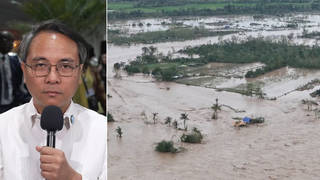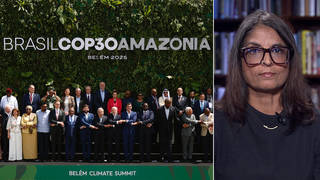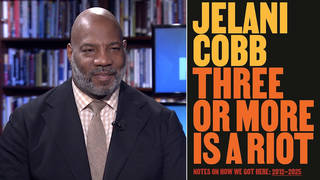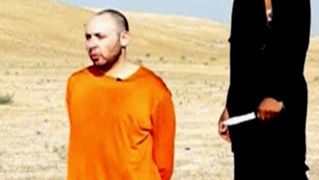
It has been nearly two-and-a-half years since American journalist Austin Tice disappeared while covering the war in Syria. At the time of his disappearance, Austin was one of the few foreign journalists who had continued reporting in Syria as the conflict intensified. He traveled extensively throughout the country filing in-depth dispatches from the frontlines. Tice is the last known U.S. reporter held in Syria, after two others — James Foley and Steven Sotloff — were beheaded by militants from the self-described Islamic State last year. Syria is said to be the world’s most dangerous country for journalists, with nearly 130 news and information providers killed since the conflict began in March 2011. Austin’s parents, Debra and Marc Tice, join us to discuss the ongoing effort to win their son’s release. We also speak to Delphine Halgand, U.S. director of Reporters Without Borders, which has has launched a public awareness campaign for Austin’s release.
Transcript
AMY GOODMAN: We turn now to the case of an American journalist who went missing in Syria over two years ago.
JEFF GLOR: In Syria alone, at least 23 members of the press were killed, and 30 are currently missing. That includes Austin Tice, who went missing 500 days ago.
WOLF BLITZER: Grainy video that surfaced online purportedly showing an American freelance journalist who’s been missing for weeks. In it, the former U.S. marine appears blindfolded and distressed, surrounded by men armed with machine guns.
JEFF GLOR: The native of Houston, a former captain in the Marine Corps, Tice was supposed to travel from the outskirts of Damascus to Beirut, Lebanon, when he went missing on August 13, 2012. Tice was a 31-year-old Georgetown Law School student when he traveled overseas to cover the conflict in Syria.
CHRISTINA HARTMAN: Video of American journalist Austin Tice surfaced online Monday, showing the 31-year-old former marine blindfolded and dragged through a desert by a group of masked men.
AUSTIN TICE: You know, you’re just talking street fighting, you know, Molotov cocktails, any weapon you can basically imagine.
JEFF GLOR: The Committee to Protect Journalists include Tice on their imprisoned list, but the family does not know who holds him. And the Assad regime has denied having him in custody.
AUSTIN TICE: Oh, Jesus! Oh, Jesus!
AMY GOODMAN: When we come back from break, we will talk about the case of Austin Tice, missing for almost two-and-a-half years in Syria. Who’s holding him? What is the U.S. government doing about it? We’ll be joined by his parents. This is Democracy Now! We’ll be back in a minute.
[break]
AMY GOODMAN: This is Democracy Now!, democracynow.org, The War and Peace Report. I’m Amy Goodman, with Juan González.
JUAN GONZÁLEZ: Eight hundred and eighty-four days ago, nearly two-and-a-half years ago, journalist Austin Tice disappeared while covering the war in Syria. The date was August 13, 2012, just two days after he turned 31 years old. A former U.S. marine from Texas who later attended Georgetown University Law School, Tice has freelanced for The Washington Post, McClatchy Newspapers, CBS and other media outlets. He grew up in Houston, was the oldest of seven children. He’s the last known U.S. reporter held in Syria. Last year, two other U.S. journalists, James Foley and Steven Sotloff, were beheaded by militants from the self-described Islamic State.
AMY GOODMAN: At the time of his disappearance, Austin Tice was one of only a few foreign journalists who continued reporting in Syria as the conflict intensified. He traveled extensively throughout the country, filing in-depth dispatches from the frontline. In late July 2012, Austin Tice posted this report from Al Tal, Syria, on his Facebook page.
AUSTIN TICE: Between the shells, it’s been a quiet day today here in the town of Al Tal, just north of the Damascus capital, as civilians have fled the town and Free Syrian Army rebel fighters have prepared for an anticipated government counterattack. Though the attack has yet to materialize, some fighters say that they think that last night’s shelling was just a warning and that tonight should be even worse. From Al Tal, Syria, for CBS, I’m Austin Tice.
JUAN GONZÁLEZ: Austin Tice posted that video on July 25th, 2012. His Facebook page hasn’t been updated since. Less than three weeks later, he disappeared. He was reportedly preparing to travel from Darayya, near Damascus, to Beirut, Lebanon, when he went missing. On the second anniversary of his disappearance, The Washington Post’s executive director, Martin Baron, said, quote, “Each month that passes without news of Austin deepens our concern for his well-being. His family has endured unimaginable pain as a result of his captivity. They have our support in their determined efforts to gain his release.”
AMY GOODMAN: Well, for more, we are joined by Austin Tice’s parents, Debra and Marc Tice, here in New York City. And we’re joined by Delphine Halgand, U.S. director of Reporters Without Borders. Her group has launched a public awareness campaign for Austin’s release. According to Reporters Without Borders, Syria is the world’s most dangerous country for journalists. Nearly 130 news and information providers have been killed since the conflict began in March 2011.
We welcome you all to Democracy Now!
MARC TICE: Thank you.
AMY GOODMAN: Marc Tice, let’s begin with you. Talk about Austin, why he went to Syria, what he was doing there as a journalist, and now where you think he is.
MARC TICE: Well, Austin is, you know, our oldest son, our firstborn. He’s a big man. He has big passions. He is committed to things. And when he gets committed, he takes action. So, one of the things that troubled him about the Syrian conflict was the lack of credible, verifiable information about what was going on there. And Austin had spent some time in the region, had an affinity for the people there. And he decided that, you know, he had the abilities and the skills to go to Syria, to see what was happening and communicate that to people in the U.S., in the Western world, so that we would know what’s happening.
AMY GOODMAN: So he freelanced for various papers and networks.
MARC TICE: He freelanced for various papers. He did a lot of work for the McClatchy news organization, which has been incredibly supportive of us and Austin since he’s gone missing. And as he moved south in the country, he was able to deliver information and reports to a number of different organizations.
JUAN GONZÁLEZ: And, Debra Tice, what’s it been like since his disappearance, first the—when you got the news that he had disappeared, and what you’ve been able to get from the U.S. government in terms of his whereabouts and his situation?
DEBRA TICE: Well, as far as his whereabouts, the government doesn’t feel free to share that information with us. When he went missing, every day we thought, you know, he’ll be back tomorrow, next week. So, going on two-and-a-half years, we still have that kind of expectation, so our lives have pretty much been suspended, in that “tomorrow, tomorrow” kind of living, where the main thing that Marc and I do is whatever we can think of to try to get Austin home.
AMY GOODMAN: Who do you believe is holding him?
DEBRA TICE: We know who is not holding him. We know that he’s not being held by ISIS or the terrorists of any kind. The Syrian government denies holding him. So that leaves us wondering who is holding him.
AMY GOODMAN: What does the U.S. government tell you, Marc?
MARC TICE: Well, the U.S. government doesn’t have, as far as we know, definitive information about exactly who’s holding him or where he is. We do believe that there is information that they have been unable to share with us, just because of security reasons and national security clearances and so forth.
AMY GOODMAN: Do you think the Syrian government is holding him?
MARC TICE: This is—this is what we do believe. Our son is missing in Syria. And it’s more than natural that we would appeal to the Syrian government, who is the sovereign entity over the state of Syria, to find him. They have the best resources. They have access to their own country. So, we’ve appealed to them, in many ways, many times, to help us find Austin and bring him safely home.
JUAN GONZÁLEZ: I want to turn to Austin Tice in his own words, explaining why he made the decision to go to Syria. In a Facebook post on July 25th, 2012, Austin wrote, quote, “We kill ourselves every day with McDonald’s and alcohol and a thousand other drugs, but we’ve lost the sense that there actually are things out there worth dying for. We’ve given away our freedoms piecemeal to robber barons, but we’re too complacent to do much but criticize those few who try to point out the obvious.” He goes on to say, quote, “So that’s why I came here to Syria, and it’s why I like being here now, right now, right in the middle of a brutal and still uncertain civil war. Every person in this country fighting for their freedom wakes up every day and goes to sleep every night with the knowledge that death could visit them at any moment. They accept that reality as the price of freedom.” That’s your son in his own words.
MARC TICE: Yes.
JUAN GONZÁLEZ: And do you feel that our government is doing enough to locate him and get him out?
MARC TICE: We feel like there’s always more that could be done. And, you know, you mentioned, Amy, Reporters Without Borders in the intro. They’ve been helping us tremendously throughout this whole process and now are helping us raise awareness of Austin’s situation.
AMY GOODMAN: Well, we are joined by Delphine Halgand. In fact, she was on Democracy Now! yesterday. She’s U.S. director of Reporters Without Borders, which is based in Paris, France, with the second-in-command at Reporters Without Borders who was one of the first to get to the massacre site in Paris. But today, Delphine, we have you on for another reason, though you addressed the Austin Tice case yesterday. You’re in Boston today. Talk about your work in Washington and what you’re learning about what’s happening with Austin, what you feel needs to be done, what the U.S. government is doing or not doing.
DELPHINE HALGAND: So, I’ve been working with the Tices since September 2012, trying to help them as much as possible, because it’s Reporters Without Borders’ work to do so, to help the families of kidnapped journalists. So, we have helped them to get in touch with former hostages, tried to help them to get some contacts with Arab-speaking media. And when they asked Reporters Without Borders to help them to raise awareness about Austin’s case in the U.S., of course we say, “OK, of course, we’re in.”
And then we convinced an ad agency in New York to prepare a campaign that we will launch very, very soon, in the next week. And right now we are calling for major media all around the U.S. to join this campaign, to be partners of the campaign, and to accept to publish on their websites, for free, banners: “Free Austin Tice.” We have been working on the ideas of the blindfold. When a journalist is missing, when Austin Tice is missing, in a sense, we are all blindfolded, because we are deprived of information. So, that’s really the main mission now, and because public awareness, public pressure will make a difference to help us to bring Austin back home. We know that it’s not a ransom issue. It’s really a political issue, and that’s why public pressure will help in that case.
JUAN GONZÁLEZ: But, Delphine, in previous kidnapping cases, the government has attempted to dissuade families from going public and sought to use back channels, basically, to find a way to free kidnapped foreigners in the Middle East. Have you got any pushback from the government on this campaign?
DELPHINE HALGAND: So, we have seen the tragic results of many hostage case recently, and I don’t want to bring back this barbarity again. And I guess the administration realized that their policy was not exactly successful, and that’s why the White House launched this policy review to try to see how they can better secure the release of their hostage. And we are, of course, with the families, like Debra and Marc, but also Diane Foley and other families of American hostage or former hostage, pushing for a better cooperation between the administration and the family, a better share of information, and also to try to review this policy to—of no negotiation. There is a difference between refusing paying a ransom and only considering a military option. And we are so welcoming this review, which was so much needed, because a lot needs to be improved.
AMY GOODMAN: The families of all four Americans kidnapped by ISIS in Syria were told they could face prosecution if they paid money to free their loved ones, ransom. Diane Foley, the mother of slain journalist James Foley, spoke to ABC News last year.
DIANE FOLEY: We had to beg. We had to—
JOHN FOLEY: The higher we went, the more difficult the [inaudible].
DIANE FOLEY: Right. And we were an annoyance, it felt, at some levels, that, you know, they really didn’t have time for us. We were told very clearly, three times, that it was illegal for us to try to ransom our son out and that we had possibility of being prosecuted. I was surprised that there was so little compassion.
AMY GOODMAN: That was Diane Foley, the mother of James Foley, who was beheaded last year. This has shown a rift between the families and the government. You’re saying that yours is not an issue of ransom. But are you feeling the same? The other issues they have raised now, as families come together, is the lack of information they get from the government. Marc, what are your thoughts on what the government is doing? Is Austin part of this, the case of your son, Austin Tice, part of this review that President Obama has called for?
MARC TICE: Well, yes, it is. And we have been given the opportunity to participate in the review. You know, we’re very gratified that President Obama recognized that there are problems with the way that hostage situations and the families of hostages are dealt with. So—and, yes, we’ve felt that. Clearly, there are issues around sharing information with the families, and I already mentioned that. There are issues internally in the government, among agencies and departments, in how effectively and efficiently information is shared there. We—
AMY GOODMAN: Were you ever threatened the way Diane Foley says she was threatened with prosecution if she dared to raise money?
MARC TICE: We heard the same advice, yes.
AMY GOODMAN: Meaning the State Department gave you the same advice?
MARC TICE: Well, we heard the same advice.
AMY GOODMAN: Or the U.S. government?
MARC TICE: However, you know, I just want to say that, again, we haven’t had to deal directly with the issue of ransom or concessions. You know, we still haven’t had anyone acknowledge or claim responsibility for Austin’s captivity. So, you know, it’s really not our place to speak of that, about that issue. However, there are a number of other issues—like I said, information sharing, both externally and internally, also just the idea of protecting the hostage themselves. One of the things that we had a very steep learning curve on, and the other families have, as well, is, you know, when an adult child goes missing, they have their whole life that they’ve left here, and a lot of our time goes to trying to protect and manage Austin’s identity and his assets so that when he comes back he has a life to come back to. We believe that, you know, there are things that the government could do to help facilitate those processes and those efforts by the families.
AMY GOODMAN: Like what?
MARC TICE: Well, for instance, financial obligations or issues around access to their social media—Facebook, Twitter—which, you know, as an adult, Austin was no longer sharing all his passwords with us. I mean, he was a grown man, 30 years old when he left. But it’s extremely difficult, because of privacy regulations and rules, for us to be able to get access to the things that we need to to protect those communication feeds and social media identity. We think that there are things that the government could put in place to simplify that for the families.
JUAN GONZÁLEZ: And, Debra, has there been any indication from the government that they believe he is still in captivity somewhere?
MARC TICE: Yes, yes, we have had information from our government assuring us that Austin is hanging in there. And so, you know, we’re still working toward getting him home. You were asking about our government. And what has happened is, Austin is suspended between two governments. And, you know, trying to take possession of him has become a part—another part of his captivity. And keeping information from us sort of keeps us from inserting ourselves into that picture. And so that’s where our frustration lies.
AMY GOODMAN: Can you explain further? And have you appealed directly to the Syrian government?
MARC TICE: We have been able to appeal directly to the Syrian government, and they have assured us that they will do everything they can to find Austin, to help us, to help us bring him home safely. And what we’re more interested in is we would like to feel more a part of the team of our government that’s getting information, that they would share information with us, so that we can use that information with our channels and our connections to reach in for our son.
JUAN GONZÁLEZ: And to your knowledge, the area where he disappeared from, was it in government-controlled areas, or was it in rebel-controlled areas?
MARC TICE: Well, that area at that time was very fluid. And so, it’s really hard to say who had control at the moment that Austin went missing. That’s part of the problem.
AMY GOODMAN: Would you like to make a direct statement to whoever is holding your son?
MARC TICE: Yes, absolutely.
AMY GOODMAN: Right into that camera.
MARC TICE: You know, we’d like to say, first of all, please, take care of Austin, keep him well, keep him safe. We don’t believe that anyone is benefiting from Austin continuing to be held and not allowed to come home. We would appeal to you to treat him well, keep him safe and return him to us as soon as you can. And, Austin, if you can hear this, we love you. We’re doing everything we can to bring you home as soon as possible.
AMY GOODMAN: And Debra? You could look right into that camera.
DEBRA TICE: I would just like to say that everyone has a mother, and I’m Austin’s mother. And I appeal to you, in the same way that your mother would appeal for you, that you let my son be released, keep him safe and give him back to our family. He has two brother-in-laws to meet. He has siblings to congratulate on life accomplishment. And we are so ready to have him home.
AMY GOODMAN: And finally, Delphine Halgand, you working at a kind of policy level and having worked in these kind of cases around the world, what you think is most important to happen right now?
DELPHINE HALGAND: Again, I think, after more than two years of looking for information, trusting the U.S. government to bring Austin safe back home, it’s time for public awareness and public pressure, because that’s really one thing we can help to bring Austin back home. And that’s why I really want to thank you to help us in this mission. And again, I look forward to work with all the media and major media in the U.S. who already expressed interest to be part of this campaign.
AMY GOODMAN: Well, I want to thank you all for being with us, Delphine Halgand, U.S. director of Reporters Without Borders, actually speaking to us from Providence, Rhode Island, and Debra and Marc Tice. Thanks so much for being with us. I know these are very difficult times for you, as they have been for the past almost two-and-a-half years now, parents of Austin Tice, the American journalist abducted in Syria in August of 2012. Of course, we will continue to follow his case.
This is Democracy Now! We’ll be back in a minute with an exclusive story. Stay with us.












Media Options